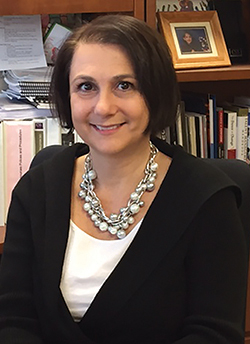Rectal Cancer Survivor
Finding Your “New Normal”

Denise Andahazy had a new baby and a demanding job when she was diagnosed with rectal cancer at age 38. Determined to cure her cancer, she pursued an aggressive treatment plan of chemotherapy, radiation and surgery. Now cancer-free, she focuses on spending time with her daughter and husband, working and volunteering with Cancer Hope Network to help others with rectal cancer.
During a business trip, I noticed blood in my stool. I emailed my doctor, who said the blood was probably from hemorrhoids because I’d recently had a baby. My daughter, Sophia, was about eight months old. Still, he said cancer was a slight possibility, so he suggested that I have a colonoscopy.
Two months later, I had the colonoscopy after almost canceling it. I was only 38 and busy at work as a Vice President of Human Resources, so I didn’t want to deal with what seemed like an unnecessary precaution. When I arrived, even the doctors asked why I was there. I seemed way too young for a colonoscopy. Now, of course, I am so glad I had it as scheduled. Two days later, the doctor who performed the colonoscopy called with the news. As the young mother of an 8-month-old, I had Stage I, borderline Stage II rectal cancer.
Obviously, I was shocked. I was in fairly good shape, ate well and had no family history of colorectal cancer. I received the call in the evening, at home. My baby was sleeping, and my husband was at a meeting. I immediately called him, then my parents, then my best friend and finally my boss. I wanted to tell everyone, get it out and move on. I knew I was going to beat it.
The next day, I started researching doctors. I was able to meet with an oncologist quickly and ended up seeing three surgeons before choosing the right one. I was very clear that I wanted the most aggressive treatment possible. I didn’t want to be back in a few years. I wanted a cure. I wanted to be around to watch my daughter grow up.
As part of my research, I also called Cancer Hope Network and spoke to a woman with a similar diagnosis. Talking to someone who’d been through it was reassuring.
I started chemotherapy and radiation therapy the month after my diagnosis. I had six weeks of chemotherapy five days a week. It’s oral chemotherapy, which I requested because it worked best with my lifestyle. I didn’t want a port because I was concerned about having one with an 8-month-old grabbing onto me. I also had radiation therapy five days a week.
To manage side effects, I started taking pills my doctor prescribed for nausea immediately. I never experienced any. After a few weeks, I felt some fatigue but continued to work full time. I had diarrhea and radiation burns on my bottom around the fifth week. The burns from radiation were the worst part of the entire treatment. I had blisters, and it was painful to sit. My skin was always irritated, and I couldn’t sleep well because of discomfort.
After chemotherapy and radiation, my cancer had almost disappeared. I could have stopped treatment and monitored the cancer, but I wanted to be aggressive and decided to have surgery. We waited about eight weeks after I finished chemotherapy and radiation to give my body time to recover and prepare for surgery.
I had two surgeries. In the first, about 20 percent of my colon was removed. The surgeon reconstructed a new rectum from my colon and gave me a temporary ostomy to allow the new rectum to heal. As part of the first surgery, my ovaries were also removed because colon cancer often metastasizes to the ovaries. Since this meant menopause overnight at age 38, I started hormone therapy right away.
The hardest part of recovering from surgery was adjusting to the shock of actually having and dealing with the ostomy, especially because I had an executive job and a young daughter. Even though I knew it was going to happen, I wasn’t prepared for the actual reality of it. I started crying in the hospital, and I am not a crier.
Three months later, I had surgery to reverse the ostomy. My new rectum had healed enough that it was time to start training it. No one explained what that would be like either. It took a while to get my colon and rectum under control. It’s never been the same, but I’ve found my new normal — and now I’m cancer-free.
I was fortunate to have amazing support from my family, friends and coworkers. My company was incredibly supportive and flexible, letting me leave early for radiation therapy and allowing me to work in the evening. Working full time during treatment helped me a lot. Staying busy meant I had no time to worry, and keeping my focus on work helped me manage my treatment. The support from all the people in my life was critical to my sanity.
I now volunteer for Cancer Hope Network, which helped me right after my diagnosis. I talk to others diagnosed with colon cancer and always tell them two things. First, cancer sucks. There’s no need to sugarcoat it or pretend it doesn’t. The second thing is that once you get through it, you may never be “normal” again, but you will find your “new” normal.
Take charge. Don’t rely on your doctors to lead the charge. You lead it. Most important, take help when it is offered. Being strong doesn’t mean doing it all by yourself. It means telling your loved ones what you need.


